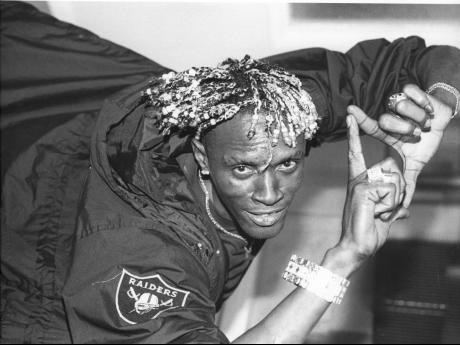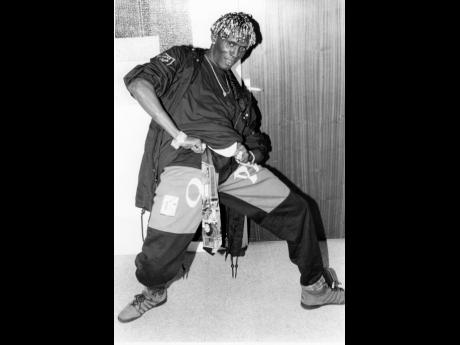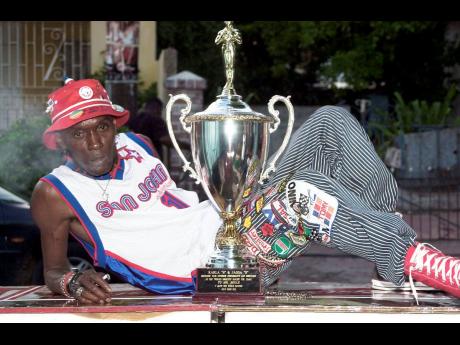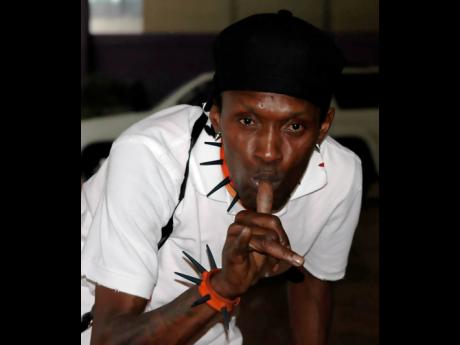Six decades later, Bogle’s impact on Jamaican culture is unmatched
August 22 marks the 60th anniversary of the birth of legendary Jamaican dancer, choreographer, artiste, and fashion icon Bogle. True to his words, his legacy is still “runnin’ di place”.
Bogle, christened Gerald Levy, was born in 1964. Hailing from the community of Lincoln Crescent in Arnett Gardens, he rose to prominence through the Black Roses Crew, headed by William August ‘Willie Haggart’ Moore. As Bogle told Entertainment Report, in a 1996 interview:
“Roses man dem deh yah bout 20 to 25 years, enuh. When wi a write roses, we a write roses wid chalk. Dem time deh we usually run the most bandulu phone bout yah.”
Still, Bogle rose to local fame in the early 1990s when he created the self-titled dance immortalised by Buju Banton’s 1992 hit, Bogle. In the same year, Jamaica got its first look at the man himself when during Banton’s Reggae Sunsplash set, he brought out Bogle to help him perform the song. By the end of the year, the song, voted by Power 106 FM as the top Reggae Song for the Year and would further propel Bogle to stardom.
By the mid-1990s, Bogle was credited with the dances Urkel and World-a-Dance. The latter became even more mainstream when Beenie Man released World Dance in 1994. The music video featured Bogle and other members of Black Roses, with the visuals shot at the crew’s home base, Black Roses Corner. This was one of the first visual indications of the friendship between Beenie Man and Bogle as the dancer appeared in several music videos of Beenie Man such as Ole Dawg.
Still, Bogle’s fame at this time was not limited to his dance moves. His fashion sense pushed the boundaries of traditional fashion at this time. Alongside the Ouch Crew, Bogle was able to tap into a punk rock-dancehall aesthetic. As a cultural academic, Dr Donna Hope told The Gleaner in 2015:
“How he dressed and how he behaved, Bogle was able to take a lot of liberties. He was very creative and took a lot of liberty with his male identity.”
Yet, his fashion did not stop at his clothes. It was the intricately layered chains, the gold tooth, the earrings, the hair, and the props to go along with it. As Lonsdale ‘Boysie’ Guy, the last remaining member of Black Roses recalled to the Jamaica Observer in 2018:
“Did you know that Bogle used to buy brand-new panties and put inna him back pocket like a kerchief or rag? Dem man deh used to wear anklet, tie dem shirt front, wear chain from dem ears to dem nose, put perm and wave inna dem hair.”
By 1998, American music video and film director Hype Williams tapped Bogle to play a role in his acclaimed feature film, Belly. Starring rappers DMX and Nas, Bogle played the part of Mr Pelpa.
By the turn of the new millennium, Bogle’s reach expanded outside of the borders of Jamaica. He was now one of the highest-profile West Indian dancers in the world, where people throughout the US, Canada, and the UK would pay to see him dance. Through this, he would also be featured in international acts’ videos, one of which was Tables Will Turn by Foxy Brown featuring Baby Cham.
By 2004, at the age of 40, Bogle was gearing up to start his music career. The age that is usually the recording twilight for many musical acts, Bogle was not deterred for as he said: “One ting wid we, we don’t tek press. We judge we own concept”.
His recording career came by way of the song Weddy Time by group Voicemail. As one of the group’s members, Kevin Blair told The Gleaner of Bogle’s first recording:
“Voicemail started in 1999. We had done other songs before meeting Bogle, but it was after meeting Bogle that we got our first hit song, Weddy Time”.
According to Blair, the success of the song is greatly attributed to Bogle, who was at every street dance promoting the song and the dance move.
Bogle, now dubbed Mr Wacky due to the popularity of his Wacky dance, would have other hits in the following months including, Weddy Time Part Two and All Dem Deh.
Still, just when it seemed that Bogle was entering a new era of his life, it was cut short. On January 20, 2005, around 3:00 a.m., Bogle was murdered while purchasing gas at a service station on Constant Spring Road in St Andrew. Just a few hours earlier, Bogle had been at the popular Weddy Weddy Wednesdays held at the Burlington Avenue headquarters of the Stone Love sound system. According to the January 21, 2005, edition of The Gleaner, reporting of his death:
“At approximately 2:35 a.m., he (Bogle) had an altercation with some men – the reasons for which are still unclear. Bogle and his entourage left and while purchasing gas at the service station, two men rode up on a motorbike. One fired gunshots at the group, killing Bogle. The other four persons were injured and taken to the hospital.”
In the wake of his death, it seems like a light went out of the dancehall space and the wider Jamaican society. At his funeral, held at the Kencot Seventh-Day Adventist Church on February 6, hundreds turned out, filling both the lower and upper levels and forcing others to stand outside and in the street. Public figures in attendance included Dr Omar Davis, the then minister of finance and planning and member of parliament for the St Andrew Southern; then minister of industry and tourism, Aloun Assamba; academics Dr Carolyn Cooper and Dr Ibo Cooper; and a slew of deejays, including Elephant Man, Bounty Killer, Harry Toddler, and Bling Dawg.
Weeks later, musical tributes were released in Bogle’s honour, but the most celebrated was Wacky Dip by Voicemail. In the song’s video, members of the dance fraternity were featured, including a then-upcoming dancer and choreographer, Ding Dong. On Bogle’s legacy in Jamaica’s dancing industry, Ding Dong, around this time, states:
“Him wull it up fi wi. A him mek people respect we as danca right now ina di worl, trust mi. Because if a neva him, dancing wouldn’t reach to the level it deh right now.”
As Ding Dong states, Bogle was one of many who led the charge for contemporary Jamaican dance to not only be seen as a vital career, but one that should be given attention in the nation’s orange economy. As Bogle paraphrased in an interview with How Fi Dance Reggae before his death:
“Where the dancing ting concern right now, nuff people can dance yes, but a nuh everybody a dancer, my yout’.”
In years to come, Bogle’s legacy and imagery have only grown. In 2009, Rihanna released the music video for her hit song, Rude Boy, where she is seen doing dance movies popularised by Bogle. In 2015, Triple L Records, released the 13-track album, Mr Wacky RIP Riddim. In 2018, during her acclaimed Coachella set, Beyonce, did a version of Wacky Dip, while dancing to a mash-up of Baby Boy and Vybz Kartel’s Fever. In 2020, The Economist dubbed Bogle the Godfather of Dancehall. A few months later, Boysie, would release the book, Inside of Black Roses, which celebrates the legacy of the crew and Bogle.
Last year, one of the biggest songs of the year, Tyrant by Masicka, paid homage to Bogle’s legacy in the dancehall space. The music video of the song featured the dancer, Colo Colo doing Wacky Dip, where Masicka himself incorporates the phrase throughout the song. In his Sumfest performance, a few weeks later, Masicka brought on numerous dancers, including Boysie and Colo Colo, to help him perform the hit song, further paying homage to the legendary dancer. Earlier this year, Protoje released the video for 30 Million, which featured a dancer, dressed in an outfit similar to Bogle’s punk/dancehall aesthetic, doing Wacky Dip, as Protoje, critiques Jamaica’s social landscape.
From his dance moves, music and fashion to his music videos and cinematic appearances, Bogle has carved out a legacy in Jamaica that is still unmatched. As Dr Donna Hope states in her book, Inna Di Dancehall: Popular Culture and the Politics of Identity in Jamaica:
“Bogle’s consummate dance prowess, his dramatic style of dress, and his consistent development of dancehall slang and dance styles indelibly mark his passage through the dancehall dis/place.”
That passage is still journeyed even almost 20 years after his death. With a new generation of dancers, some prominent public figures in the Jamaican entertainment space, Bogle’s influence on the space still shines. As he stated before his untimely death when speaking about his legacy:
“Anytime you a seh Bogle, jus seh di man, di history an di dance.”
J.T. Davy is a member of the historical and political content collective, Tenement Yaad Media, where she co-produces their popular historical podcast, Lest We Forget. She is also a writer at the regional collective, Our Caribbean Figures. Send feedback to jordpilot@hotmail.com and entertainment@gleanerjm.com.




